#Illithid currency
Explore tagged Tumblr posts
Text
Illithids.
Illithids my beloved. If you’ve played D&D for any amount of time, you know what I’m talking about. They’re squid-headed creatures which subsist on anthropoid brains, and can read/change minds. Continue reading if you must, but I warn you, these creatures don’t take kindly to being known. According to the Ancient Tomes (Gary Gygax’s exchanges with others), these creatures are meant to be lorekeepers, and only speak to others if they have knowledge, wisdom, or power to give them. Gold means naught to these creatures, and according to the wikipedia page for Oryndoll, their physical currency is the eyes of those who have seen and known. Tangentially related, but Stritchy’s eyes would count. Here’s Stritchy, with his own take on this*:

“I’d really rather not have my eyes used as currency, please. Also, using a screenshot of me is very rude. You could have just asked me. As an aside from that, don’t put words in my mouth. It’s a bridge, it’s meant to hold things, not spew them.” Thanks, Stritchy, for your divine wisdom! Anyways, the hierarchy of illithid currency is as follows: Low-intelligence creatures (1 copper) Creatures which are sentient, but not smart (1 silver) Creatures which are sentient and can speak (1 electrum) Creatures that are sentient and speak eloquently (1 gold) Creatures of unknowably high wisdom (1 platinum)
This fluctuates depending on the amount of psychic residue in, on, and around the eye. For Stritchy, the base value is 1 copper. However, due to its catchphrase “Big Wall”, this value is changed to that for incredibly wise creatures, boosting it up to 1 platinum. However, since Stritchy is not something that would normally have sentience or an intelligence stat, this value is boosted to 13 platinum and 2 gold. Add the wisdom that’s simply oozing from the depths of its ebony irises, and you have exactly 17 platinum, 4 gold, 9 electrum, and 2 copper. This can buy a whole year’s supply of the finest brains from Glyth. Thank you for reading my horrible thoughts, they were never meant to be shared. *Stritchy did not agree to this, nor is he anywhere near me or my friends, and therefore we feel as though we are safe from Stritchy. Stritchy is the home decor of Joe Hawley, and is therefore “owned” by Joe Hawley. It merely resides in his home, though, rather than being owned, so is he really the proprietor of Stritchy? Or is he merely its landlord?
#Illithids#them damn illithids#Illithid currency#Stritchy#Stritchy the Wall Decor#Big Wall#Copyright Stritchy I think#I do not know if Stritchy has copyright to itself#Does Joe Hawley have Stritchy's copyright?#I am not to know.#Sic Semper Stritchy#Sic Semper Joe Hawley#Joe Hawley#If Joe Hawley persists contact your local Joe Hawley control center immediately.#Joe Hawley Joe Hawley Joe Hawley Joe Hawley Joe Hawley Joe Hawley Joe Hawley Joe Hawley Joe Hawley Joe Hawley Joe Hawley Joe Hawley Joe Hawl
1 note
·
View note
Text
Illithid Souls - Part 1
What’s up with mind flayers and souls anyway?
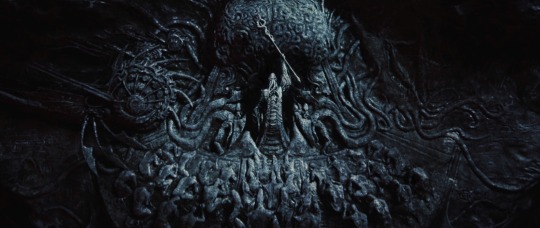
I know this deep dive has been done before like a hundred times, based on all the Reddit threads I’ve read, but I feel like a lot of the "evidence" has been scattered about in a lot of places (reddit, tumblr, other threads, other socials, etc). So I figured...why not gather a lot of it here in one place?
As with all my deep dives, this post is designed to equip you with some lore so you can build your own theories and ideas. I’ll offer theories that I find interesting or feasible, but lore is always a little hazy so I’m bound to be wrong or you’re bound to interpret things differently. Just have fun with the lore!
I’ll start by defining what D&D calls a soul, and then…well it unravels from there. In this part we're going to dive into the lore about souls, the afterlife, and where mind flayers differ, along with a bit of in-game context. In Part 2 we'll look at individual case studies (Tav/Durge, Orpheus, Karlach, and Gale).
Buckle up, folks, cause it's a long one!
As always, I’ll include images and image descriptors/text written out in case the pictures fail or are too small to read!
What is a soul?
The entire game of Baldur's Gate 3 is heavily invested in the idea of souls. Raphael wants to bargain with your soul. Mizora has Wyll's soul bound to a contract. Cazador plans to sacrifice 7007 souls. Vlaakith consumes the souls of her faithful. Karlach wants to collect (and use) soul coins. Every tadpoled follower of the Absolute is called a True Soul. This game is OBSESSED with souls.
But it never actually defines a soul, does it? So what do the official D&D rules say?
Well...they don't. Older editions used to split hairs about the difference between a soul and a spirit, but those older editions also used to say that elves, orcs, and half-orcs didn't have souls, so...we've moved on a bit from those days.
In the game, a book on soul coins defines souls as "the sum of personal and magical essence," which is both helpful and vague. The general player consensus is that a soul is the animating "force" that is made up of memories, personality, intelligence, and (possibly) morality, and that in some cases, such as the spell Speak with Dead, a soul differs from a spirit, which merely "animates" the body but does not actually possess the personality or the thinking capabilities of the deceased (though it may have access to memories).
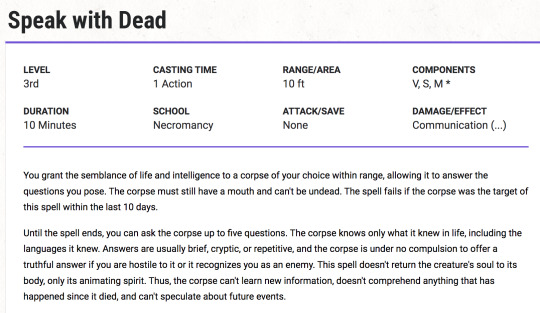
Speak with Dead [...] Until the spell ends, you can ask the corpse up to five questions. The corpse knows only what it knew in life, including the languages it knew. [...] This spell doesn't return the creature's soul to its body, only its animating spirit. Thus, the corpse can't learn new information, doesn't comprehend anything that has happened since it died, and can't speculate about future events.
So there's a chance that while an entire soul is generally made up of personality, memories, and some element of active thinking/decision making/speculation (intelligence, for lack of a better term), the part of a soul that functions as an "animating spirit" is what houses memory. In other words, animating spirit (memories) + personality + intelligence = soul.
This idea of the animating spirit (memories) being housed within a soul, but also detachable from a soul, is important for later, so remember this in a bit.
Souls also have power, which is why the game is obsessed with everyone fighting over souls. Raphael, Mizora, and Cazador trade in souls in exchange for power. There are insinuations in the game that the gods want to stop the "scourge of soulless illithids" (Mystra's words) because souls are a kind of currency to them (though, trust me, trying to find a recent D&D source that clearly states that particular stance is a damn migraine of an endeavor). But Withers does say that souls imbue gods with power, so the game at least operates with that assumption in mind.
According to Withers…
We all know that Withers, aka Jergal, aka the Final Scribe, aka the former god of death, aka the expert on souls, has plenty to say when you ask him to elaborate on anything:
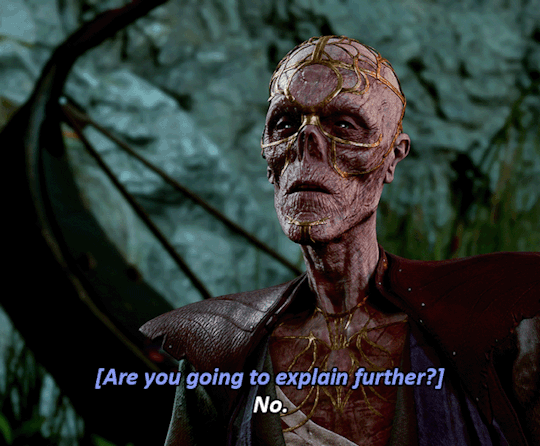
Well, okay, maybe he doesn't. But he does have a bit more to say about souls and mind flayers. For example, when he first brings up the topic of illithids and souls in Moonrise, this is some of the information he can give the player.

Withers: I shall ask yet again. Do illithids possess souls? Player: These abominations are soulless, surely. Withers: Correct. - Player: I'm not sure. Don't all living things? Withers: No. Nor canst thou count mind flayers among them. - Player: I admit I haven't thought about it. Withers: Thou shalt think about it now, and I shall give the answer. Mind flayers are soulless. Yet the Three amass an illithid army, void of apostolic souls that could imbue them with power.
A couple of things to note here. Jergal, the guy in charge of putting down the names of people who die and keeping track of where their souls go, is pretty clear that he thinks mind flayers don't have souls. But his last statement clarifies two things: one, that he is referring specifically to apostolic souls (more on that in a bit) and that souls imbue gods with power.
Souls give the gods a kind of strength. He brings this up when he criticizes the dumb plot the Dead Three came up with in his post-epilogue scene:
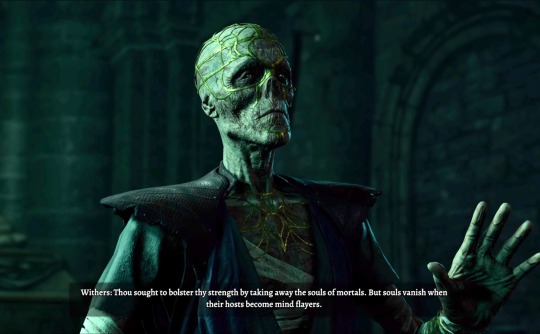
Thou sought to bolster thy strength by taking away the souls of mortals. But souls vanish when their hosts become mind flayers.
So we know that souls are a source of power for deities and gods because they imbue gods with power and strength. But gods only get the power of these souls after a mortal dies with their soul intact. If someone becomes a mind flayer...well, let's just say the natural order of things gets disrupted.
What happens when you die?
You see, normally, when someone dies in Faerûn (assuming they are humanoid), their soul travels to the Fugue Plane where it basically waits around until a deity picks them up or Kelemvor decides they're just going to be part of the Wall of the Faithless for forever. From the Sword Coast Adventurer's Guide (page 20 because I am, as youtuber Swoop says in her docs, a thorough bitch):
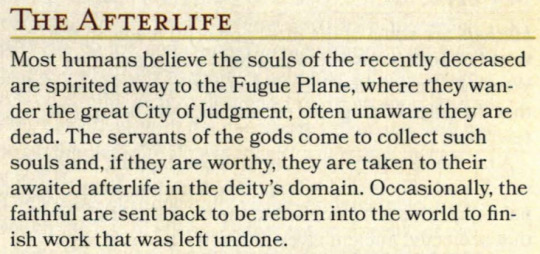
The Afterlife Most humans believe the souls of the recently deceased are spirited away to the Fugue Plane, where they wander the great City of Judgment, often unaware they are dead. The servants of the gods come to collect such souls and, if they are worthy, they are taken to their awaited afterlife in the deity's domain. Occasionally, the faithful are sent back to be reborn into the world to finish work that was left undone.
This is where the idea of apostolic souls comes in. Apostolic, in its most basic definition, means "having the characteristics of an apostle," or having the characteristics of someone who dedicates their entire lives to the teaching of a particular religious figure (in our context and reality, this mostly means the apostles of Christ, but in BG3 it would refer to any deity). I think here, the definition gets stretched a little thinner to mean any soul that is capable of devotion to a deity, rather than a soul that is already devoted. Apostolic souls can be Faithful, Faithless, or False (which is how souls are separated in the Fugue Plane).
In other words, an apostolic soul is a humanoid-specific soul that the deities recognize and can use as a source of power by inviting said soul into their domain. Mind flayers do not have apostolic souls. Emphasis on apostolic here, but we'll back to mind flayers in a minute. For now, let's look at the Faithless and False souls.
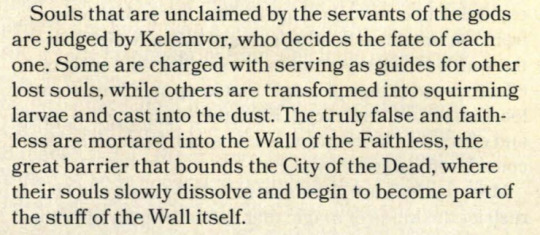
Souls that are unclaimed by the servants of the gods are judged by Kelemvor, who decides the fate of each one. Some are charged with serving as guides for other lost souls, while others are transformed into squirming larvae and cast into the dust. The truly false and faithless are mortared into the Wall of the Faithless, the great barrier that bounds the City of the Dead, where their souls slowly dissolve and begin to become part of the stuff of the Wall itself.
Depressing.
The distinction between a Faithless and a False soul is a little hazy, but according to the Forgotten Realms wiki, a Faithless soul is someone who never aligned themselves to the worship of a specific deity or who just didn't believe in the existence of the gods at all (think of Astarion, who outright rejects all gods). A False soul, in contrast, is someone who did believe but failed to serve their god or outright betrayed them (a fate that Gale feels he is faced with for being on Mystra's bad side). Allegedly all the Faithless end up becoming part of the Wall, whereas the False could get mitigated sentences, such as becoming guides for other souls.
Of course, there's nothing stopping deities from combing through Faithless or False souls to collect them into their domains. But it could take a while. Clearly, the more souls a god collects into their domains, the more powerful they become, but the gods are also not exactly fighting over the souls of Faithless or False people, because people can end up waiting hundreds of years before Kelemvor is finally like "guess you're part of the wall now." Your only option to get out of that is to sell your soul to a devil, which isn't a much better fate.
From The Sword Coast Adventurer's Guide, page 25, regarding servants of Asmodeus:
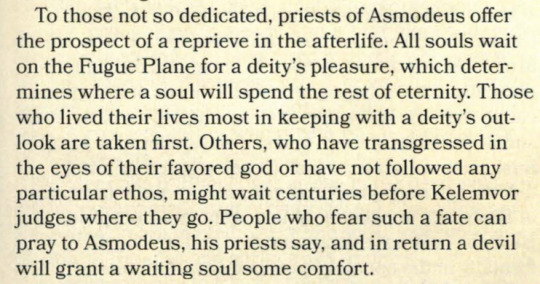
To those not so dedicated, priests of Asmodeus offer the prospect of a reprieve in the afterlife. All souls wait on the Fugue Plane for a deity's pleasure, which determines where a soul will spend the rest of eternity. Those who lived their lives most in keeping with a deity's outlook are taken first. Others, who have transgressed in the eyes of their favored god or have not followed any particular ethos, might wait centuries before Kelemvor judges where they go. People who fear such a fate can pray to Asmodeus, his priests say, and in return a devil will grant a waiting soul some comfort.
This makes me infer two things: first, that the gods are kind of picky about which souls they want to join their domain (regardless of what actually happens to that soul in a deity's domain, which is a topic for a different post entirely, because the results may vary) and therefore the gods aren't just going to go with any soul that ends up in the Fugue Plane. Second, that the gods aren't exactly in a hurry to choose among wandering souls, likely because the Material Plane just keeps producing and destroying mortals, resulting in a constant flow of souls.
We see a glimpse of a god's perspective on the influx of souls when Gale confronts Mystra in the Stormshore Tabernacle (in this case, when you play him as an Origin):

Gale: You're one to talk. How many innocents were you prepared to sacrifice if I detonated the orb? Mystra: Such eddies are unexpectional. Souls arrive and depart your plane with every tide, in circumstances just and unjust. The Weave cannot be lost because we are unwilling to cause a ripple. And that is what is at stake.
She then goes on to say "With each day that passes, the elder brain threatens to become a new kind of god, its worshippers a scourge of soulless illithids." This is what's at stake. The loss of souls on the Material Plane.
The Absolute plot threatens that cycle of birth and death, of souls arriving and departing. But how, exactly, is the mind flayer plot a threat?
Well, for one, if everyone with a tadpole turns into an illithid (which doesn't have an apostolic soul, Withers is adamant about this), and then all the illithids kill all the non-illithids...who is making new babies with apostolic souls? And if there are no new fresh souls, eventually the deities will just also die out, since no one will be left to believe in them and thus their powers will diminish and eventually fade. It might take a few hundred years, but it still spells death for everyone involved.
The irony here is that it means the Dead Three gambled and lost even if their plan to ascend a Netherbrain ends with a success, such as when Tav or Durge decides to dominate the world by controlling the Netherbrain. Either the brain is destroyed and they lose, or the Netherbrain successfully completes its Grand Design and they really lose, because the only winner here after a thousand years would be the Netherbrain. Thus we have Withers taunting them in the post-epilogue scene by asking if they really thought their ploy would succeed.
Okay...so we know that mind flayers killing everyone on the planet is a bad idea because it means that apostolic souls stop arriving in the Fugue Plane. But what about mind flayers? If they don't have apostolic souls, do they have ANY soul worth eternal currency?
Remember, the only way to create more mind flayers is to tadpole a humanoid creature. Without humanoids, mind flayers can't reproduce. But when humanoids turn into mind flayers, they allegedly lose their souls. Right?
Withers says souls "vanish" when the body turns into a mind flayer. But this is vague, and thus allows for a few different theories. Perhaps souls move on to the Fugue Plane while the person-turned-mind-flayer continues existing on the Material Plane. Perhaps the soul just becomes obscured and unrecognizable by the gods. Or perhaps the soul really does go poof and is replaced by something else entirely.
So which is it? Well...first of all, let's set the record straight on mind flayer souls.
Do mind flayers have souls?
The short answer is...yes. They just don't have apostolic souls.
According to Volo's Guide to Monsters (page 80 for those looking through their copies at home):
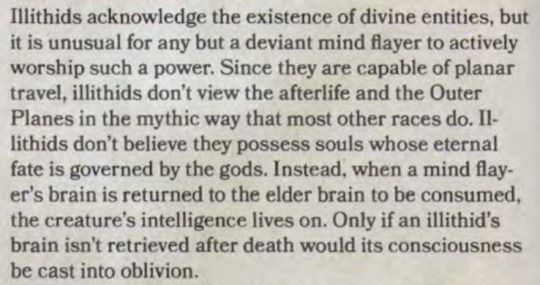
Illithids acknowledge the existence of divine entities, but it is unusual for any but a deviant mind flayer to actively worship such a power. Since they are capable of planar travel, illithids don't view the afterlife and the Outer Planes in the mythic way that most other races do. Illithids don't believe they possess souls whose eternal fate is governed by the gods. Instead, when a mind flayer's brain is returned to the elder brain to be consumed, the creature's intelligence lives on. Only if an illithid's brain isn't retrieved after death would its consciousness be cast into oblivion.
And on page 72:
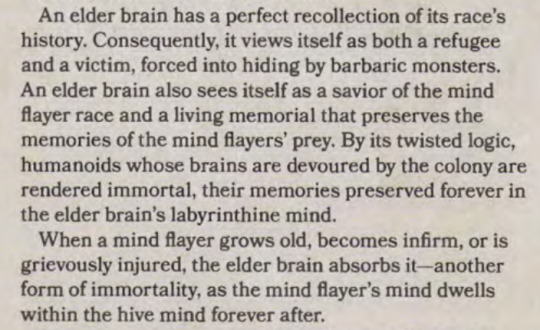
An elder brain has a perfect recollection of its race's history. Consequently, it views itself as both a refugee and a victim, forced into hiding by barbaric monsters. An elder brain also sees itself as a savior of the mind flayer race and a living memorial that preserves the memories of the mind flayers' prey. By its twisted logic, humanoids whose brains are devoured by the colony are rendered immortal, their memories preserved forever in the elder brain's labyrinthine mind. When a mind flayer grows old, becomes infirm, or is previously injured, the elder brain absorbs it—another form of immortality, as the mind flayer's mind dwells within the hive mind forever after.
So essentially, mind flayers do have a soul, but because they are a) not humanoid but are aberrations from another plane, and b) not faithful to the deities of Faerûn, their souls are not recognized by the gods. The souls might not even journey to the Fugue Plane when they die. Instead, mind flayers give up their consciousness (their memories, especially) to an elder brain to become part of its eternal collective memory.
It's worth noting that Volo's Guide to Monsters puts emphasis on memory and intelligence here, but not necessarily personality. Mind flayers and elder brains do have a kind of personality, because they experience emotions (we'll look at some conversations with the Emperor in Part 2), but their emotional range seems to be a little limited. For example, regarding elder brains:

An elder brain is arrogant, scheming, and power hungry, yet quick to flee or beg for mercy in the face of a powerful foe. It has no conception of joy, sympathy, or charity, but is well acquainted with fear, anger, and curiosity. It is an intellect utterly incapable of empathy or concern for creatures other than itself.
These limited emotions suggest there might be some element of personality here, but it's not exactly the same as a humanoid personality, which would normally be capable of a wider scope of emotional range. We'll talk a lot more about personality and how transforming into a mind flayer alters that part of one's identity (if not their actual soul) more in Part 2, but for now, just know that a mind flayer technically has all the elements usually present in a soul: an animating spirit (memories), intelligence, and personality (emotion).
When mind flayers die, their memories and intelligence are usually consumed by an elder brain, but it's unclear if the personality is too, or if the personality is destroyed. However, if they're not enthralled to an elder brain or if they die and their brain isn't retrieved to give to an elder brain...then their soul is "cast into oblivion."
Being cast into oblivion could mean anything. It could mean that their soul simply wanders around wherever it died, untethered to anything but unable to move on. Or it could mean that their soul simply ceases to exist. No one really knows what happens to it because renegade mind flayers are extremely rare. BG3 has Omeluum and the Emperor, but other than those two, official D&D lore only lists a small handful of other renegades out of millions of mind flayers over time.
So now you're probably thinking, "Well, wait, but is a mind flayer's soul the same soul that a person had before they became a mind flayer?" And the answer to that is complicated.
Let's talk about ceremorphosis
Normally a mind flayer isn't supposed to remember much of its life prior to ceremorphosis. This is partly why mind flayers eat brains, so they can literally absorb the memories of other creatures and make those memories part of the hive mind. But initially, after ceremorphosis, it seems like the the usual animating spirit (memories) of a person gets destroyed or displaced.
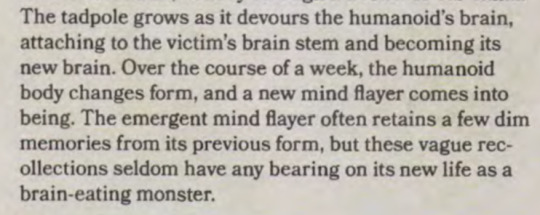
The tadpole grows as it devours the humanoid's brain, attaching to the victim's brain stem and becoming its new brain. Over the course of a week, the humanoid body changes form, and a new mind flayer comes into being. The emergent mind flayer often retains a few dim memories from its previous form, but these vague recollections seldom have any bearing on its new life as a brain-eating monster.
So right off the bat, a typical mind flayer loses the memories (perhaps the animating spirit) of the original host, and it's likely that it loses a lot of the initial personality as well (since it seems likely to lose some of the emotional range). Its intelligence is likely altered too, since the tadpole is literally eating brain matter. So this could lead us to believe two things.
First, that ceremorphosis utterly destroys the host's body and the host's soul likely goes to the Fugue Plane because they have basically died. Their brain has been consumed and their body transformed, so in essence they can't be themselves anymore. Instead, a new soul has taken residence inside the mind flayer body, though where this soul comes from is unclear since tadpoles probably don't have souls. The original soul, however, is free to move to the Fugue Plane and beyond.
Or, alternatively, the host's soul is transformed, shedding memories and personality to become a non-apostolic soul that aligns with an elder brain's hive mind somehow. This means that the host's apostolic soul might be destroyed because it's been changed so drastically, but there are some parts of the original soul still left (the lingering memories, for example). This means the host's original soul didn't move on, but is tethered to the mind flayer body and has been changed into something unrecognizable. When the mind flayer dies, the former apostolic-soul-turned-illithid-soul is either consumed by an elder brain or cast into oblivion.
If the first theory is correct, it seems a little odd that the BG3 companions are so concerned about losing their own souls. If it would just be the same as dying, there would still be some desire to avoid the fate of ceremorphosis, but the companions seem incredibly concerned about losing their own autonomy, as if their consciousness will be trapped inside a mind flayer body and their souls forfeit and unable to move on to the Fugue Plane. After all, Withers is in the business of plucking souls out of the Fugue Plane when we inevitably die in the game.
Specifically, Withers can take a body that has been completely turned to ash and resurrect it with True Resurrection, a spell powerful enough to completely restore a body to its former state. However, there is some assumption here that he wouldn't be able to do this with a mind flayer body, thus the push in the game for a cure.
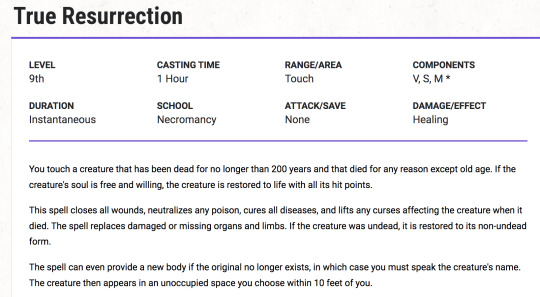
True Resurrection You touch a creature that has been dead for no longer than 200 years and that died for any reason except old age. If the creature's soul is free and willing, the creature is restored to life with all its hit points. This spell closes all wounds, neutralizes any poison, cures all diseases, and lifts any curses affecting the creature when it died. The spell replaces damaged or missing organs and limbs. If the creature was undead, it is restored to its non-undead form. The spell can even provide a new body if the original no longer exists, in which case you must speak the creature's name. The creature then appears in an unoccupied space you choose within 10 feet of you.
In other words, if theory one is correct, and a person simply dies when they become a mind flayer, Withers should technically be able to resurrect them by pulling their soul out of the Fugue Plane and giving them a new body. You'd have a weird mind flayer clone of you running around, but you wouldn't have to worry about ceremorphosis again.
(But then again, we know the game ignores the organ-regrowing properties of True Resurrection for Karlach, too, so the game intentionally limits the capabilities of True Resurrection.)
If theory two is correct, and the lore is extremely unclear about this process if this is the case, then the companions' reactions and dialogues make a bit more sense. They all talk as though turning into a mind flayer means their soul is somehow destroyed. Mind flayers having souls is likely not common knowledge in the universe (certainly no one in the game is arguing that they have souls), so if a person's soul is transformed beyond recognition it could certainly seem like the host's soul got destroyed. Additionally, this would result in a person's consciousness being trapped inside a mind flayer body, so the loss of autonomy would be a terrifying possibility here.
Plus, we know that when a mind flayer dies, the soul they have (whether a brand new soul or an apostolic soul that has been altered) is consumed or thrown into oblivion. So if theory two is correct, there will be no eternal consciousness for you, allegedly (though there's some debate as to how much eternal consciousness you have in the Fugue Plane or the Outer Planes too...)
We don't know which of these theories is correct, and the game sort of slides between these two theories (as we'll see in Part 2). But, and I cannot stress this enough, this lore only applies to normal mind flayers.
BG3 has altered the usual mind flayer tadpoles with Netherese magic such that things get a little wonky. And beyond that, the ultimate tadpole that changes you (or Karlach, or Orpheus) into a mind flayer capable of wielding the Netherstones is a Supreme Tadpole that has been further altered by the Emperor:
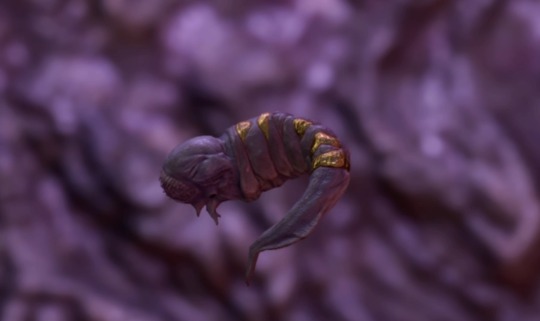

The Emperor: I took this one from the nautiloid. I have been nurturing it ever since - priming it for your use. It is not dissimilar to the experience you already had with the previous one. Only this one is much more potent. All you have to do is open your mind to it. Its latent potential will do the rest.
We don't know how the Emperor has been priming this tadpole, but if it came from the nautiloid, then it is imbued with the same Netherese magic as all the other tadpoles. It's not the same as the Astral-touched tadpole (from Act 2), which has been in the Astral Prism for millennia, but it is somehow more powerful, or at least more effective in transforming you into a new kind of mind flayer, one that can think independently of the elder brain.
So now you (or Orpheus, or Karlach) are a new special kind of mind flayer. Does that change anything?
Yes. In fact, it seems to change quite a lot. But this post is already super long, so you'll have to check out Part 2 to see what I mean.
~*~*~
You made it to the end! Gold stars!!!
✨⭐️🌟⭐️✨
I'll link part 2 soon~
Tagging those who wanted an update! @galesdevoteewife @stuffforthestash
#bg3#baldur's gate 3#mind flayer#the emperor#bg3 lore#bg3 meta#bg3 deep dive#deep dive#long post#super long post#yall the days I put into this#who let me do this to myself
88 notes
·
View notes
Text
Infernal Jurisprudence: Chapter 1
Summary: It had been centuries since a specific soul captured Raphael’s attention so completely. The devil coveted her body and soul and sought to ensnare her in a contract at any cost. It wouldn’t be long before her desperation set in, and a cat would capture a Little Mouse within his claws. And that, love, was that.
Notes: This is a relatively short prequel to the Fine Print, where Raphael schemes to ensnare Tav. Should be readable without reading the Fine Print first. Note that this fic is going to contain a ton of BG3 spoilers - so you know, don’t read it if you don’t want to be spoiled. Or do. I don’t control you.
[AO3]
Chapter 1: The Mouse
Raphael had closed thousands upon thousands of contracts for boons in exchange for mortal souls. Mortals were so often fragile and desperate, and it was such a delectable combination that always leads to a favorable negotiation. He savored the smell of nervous sweat and the motions of trembling. Other times, the mortals viewed the deal for their soul like a joke. Raphael would sit across from them in his human guise, with a smile that even reached his eyes as he watched the signatures dance upon the scrolls.
The devil would feed on their sins as they fell deeper into his traps. Greed was a standard flavor of sin, occurring so often that the souls that bore it felt more like a commodity. Some souls were envious and left a void in their wake, leaving one hungrier after the meal. Lust was heady and sweet with an underlying bitterness and shame. Wrath was the spice of pepper that led to deep burning consequences like blood and gallows. Pride was Raphael’s favorite sin to sup. Pride was complex and often unique with underlying flavors of other dishes that were unique to each mortal.
So many mortal souls. So simple. So easy.
Raphael sought Faerun for desperate souls. A powerful soul would command a higher price point. Along the Chionthar, he found the type of souls that he favored. There was an entire collection of desperate fools needing a savior.
He was a savior. That was for certain.
Raphael grinned as he surveyed his prey. A sorceress with scales. A dominating Gith. A discarded wizard. A cleric absent memory. A masquerading vampling. A warlock pacted to one of Zariel’s assets. A burning Tiefling.
He watched them silently, delighted by the haul that he could soon collect. They were all desperate and infected. Beyond existing as mere currency for his Infernal machinations, all of the band of infected had power. Power enough to collect a Crown that Raphael had been coveting for millennia.
Raphael was a patient devil. He would show himself when the time was right and true fear had taken root within their addled minds.
He happily watched through the scrying mirror as the Gith argued with the sorceress of the need to find a creche. The poorly-concealed Sharran cleric held the only power keeping them from their Illithid fates. The runed dodecahedron hummed and glowed and kept their souls intact while tucked tightly within her supplies.
It was oh, so convenient that he, the great Raphael, held the very weapon that could free the captive Githyanki inside the Astral Prism. So very convenient, indeed.
His wrists with Infernal chains were bound
Mother Gith’s son, equipped to destroy the Illithid
Trapped within an Astral Prism now found
That Vlaakith once she herself hid.
Raphael could sense the rising anxiety amongst the band of adventurers, as the Druid grove proved to be a hindrance rather than a help. The sorceress was poisoned by an overeager apprentice healer, but all managed to survive the encounter. He could taste the rising desperation as the options started to disappear.
It was time to make his entrance from stage right.
Little mice and rats and squirrels (and one unruly frog) had few places to run on a nearby broken bridge. Raphael straightened his doublet and snapped, appearing before his adventurers in a flurry of embers with the scent of cherries following him.
The sorceress eyed him curiously. She was pale with patches of silvery white dragon scales adorning her upper forehead and cheekbones. Brunette curls were pinned back behind her head and trailing down her back. Her green eyes gleamed at him, and her pleasant mouth twisted into a light smile.
“Hello, pleased to make your acquaintance,” she said calmly, offering her hand in greeting. Raphael found the deviation from his script displeasing.
The cambion cleared his throat. “Pleased to make your acquaintance,” he lifted her hand and kissed the back of it gently, trying to regain control of the scene.
He gave her a gentle smile before beginning his lines. “My, my, what manner of place is this?” Raphael offered smoothly.
The sorceress laughed. “Somewhere in Faerun between Baldur’s Gate and Elturel,” she offered easily. Raphael’s eyes narrowed. This was his scene.
“Is it a path to redemption, or a road to damnation?” Raphael gave a grand gesture of uncertainty in their path forward. “Hard to say, for your journey is just beginning.” Raphael gave his characteristic grin.
The sorceress smirked at him. “The mindflayer tadpoles would suggest a path to redemption,” she laughed sarcastically. Raphael bristled at the way she was mocking him.
He absolutely should flay her. He should take her back to the House of Hope, strip her down and-
Raphael pushed down his feelings, though he was aware how beautiful the silver-scaled sorceress was. “What would suit the occasion? The words to a lullaby perhaps? The mouse smiled brightly: it outfoxed the cat! Then down came the claw-” he was rudely interrupted by a sorceress.
“And that, love, was that,” she finished easily.
“They do know how to write them in Cormyr don’t they?” Raphael waited for her agreement.
“I prefer the lullabies from the dales,” the sorceress responded. “They have a wider variety of animals in their verse. More chickens and cattle and pigs.”
He absolutely could not let this beautiful sorceress continue to disrupt his scene.
Raphael dramatically bowed. “I am Raphael, very much at your service, my dear.”
“Tav,” she responded quickly. He raised an eyebrow. ‘Tav’ was so undignified, it had to be shortened for a much more appropriate name.
“This quaint little scene is decidedly much too middle-of-nowhere for my tastes. Come.” Raphael invited with a snap of embers.
His adventurers had arrived at the House of Hope, a grand feast awaiting them. The Warlock and the burning Tiefling responded with panic. The Sharran and the Gith were thoroughly confused. The vampling and wizard stood concerned.
The sorceress, Tav, was unimpressed. She went to the feast table and immediately started to load a plate. Raphael’s eyes narrowed. What was she doing?
He cleared his throat. “There, middle-of-somewhere,” he recited. Tav was buttering a piece of bread before putting it onto her plate with other fruits and vegetables from Toril. The sorceress seemed entirely uninterested in the conversation as she sat down at the table and started to eat.
Raphael addressed the discarded wizard. “The House of Hope, where the tired come to rest, and the famished come to feast - lavishly,” he glared at the adventurer blatantly ignoring him. She was cutting a piece of Durinbold cheese from a wheel on the table.
Raphael motioned to the table where the sorceress sat, indulging her appetites. “Go on. Partake. Enjoy your supper,” he invited with a broad grin. “After all, it might just be your last.”
The devil grinned, waiting to see what most of the adventurers would do. Most of the adventurers stood still, except for Tav, who seemed to be feasting without concern, unlike the shock and fear from her companions.
The sorceress placed her fork on her plate with a light tink. “You may as well show them what you truly are,” she challenged, lightly dabbing at her beautiful mouth with the napkin she had grabbed from her lap.
Raphael tried not to sneer at the gluttonous creature before him. “Well, far be it from me to disappoint.” He shed his human guise, appearing before the adventurers in his cambion form. The sorceress Tav only smirked at him as he shook off the lingering flames from the transformation.
Raphael stared at Tav where she sat at his table. “What’s better than a devil you don’t know?” He chuckled lightly to himself, “a devil you do.” The sorceress sat unmoved by his speech.
There was growing concern within the adventuring group. “Shit, a cambion,” the fiery Tiefling spit angrily. All of them were filled with unease. All but one. The sorceress.
Their visages were set in fear quite alight,
Contracts should not be too hard to press.
All of them destined to a horrible plight.
All afraid except for one sorceress.
Tav.
She cocked her head and watched him continue his speech. “Am I a friend? Potentially. An adversary? Conceivably. But a savior? That’s for certain,” he delivered with a smug grin, just as he rehearsed. She continued to watch him silently with a slight smile on her face, no longer interrupting his performance with her off script lines.
“What makes you think we need saving?” the wizard challenged. Raphael raised his hands and motioned easily towards their heads.
“You’re in deep over your tadpooled heads,” Raphael challenged, once again looking at where the sorceress sat. She had taken up eating her meal again, observing the conversation but not contributing to it.
“One skull, two tenants and-” Raphael started, motioning to the wizard.
“You are the only solution to our problem,” the sorceress, Tav, blurted out in perfect Infernal. “Obviously.”
Raphael had to swallow down his surprise that a human with draconic heritage spoke the language of the Hells. Tav took a swallow from a goblet of wine, looking down at her plate again, as if she was debating whether to pick up her fork and continue eating.
Her companions all turned towards her after she finished her quip in the Devil’s tongue. Raphael cracked a smile, gathering crucial information that none of them had realized of her linguistic prowess.
“You realize I could fix it all like that?” Raphael snapped and a lick of flame sputtered from his claws.
“Of course you could,” Tav answered. She placed her napkin on her plate and stood, brushing out her robes. “Though I doubt you would do it for free.”
She gazed above him at his portrait - one of Raphael’s finest, showing his command over Hellfire and the horizons of Avernus.
Tav walked in front of her companions and stood before him. His jaw clenched at her continued acts of defiance.
“Go ahead, exhaust every possibility until none are left.” He had practiced the last section several times and was frustrated at her continued insistence on going off script. “I will be waiting,” he growled menacingly.
He snapped and returned the sorceress’s companions to Prime Material.
Tav smiled at him. “Thank you for your hospitality, Raphael,” she continued in Infernal. He snapped again and sent that foul creature back to whence she had come.
He took a deep breath. Tav lingered in his mind. She was quite beautiful, especially for a mortal. She had known what he was as soon as they met while her companions remained unaware.
Who was she?
Raphael sighed in frustration. He would need to learn more about this Little Mouse.
40 notes
·
View notes
Text
'The moneylenders of Menzoberranzan also deal in trade bars, rare shells, the jarred and jellied eyeballs used by some mind flayers...'
New illithid lore for you: eyeballs are currency. How many people do we need to enucleate to afford the bribe to make the Absolute serve us or pack up and go home? How many to bribe the Emperor to shut the fuck up about putting tadpoles in my brain? Point me to a beholder lair, I'm about to get rich...
#Did Durge make friends with Absolute by offering her the eyes of their kills?#I guess if you need to eat people then you rack up a lot of bodies; you might as well find uses for them?#...What do mind flayers even need currency for?#lore stuff#edgelord hours
14 notes
·
View notes
Text
@thesubjugoated location: outside the forum notes: pre memorial
While Felandaris had little interest in the memorial itself, he had spent fifteen years sequestered away with some of the worst types of people imaginable. Heroic martyrs, bleeding hearted simpletons, woefully depressed peasants, and irrefutably repugnant commoners. Alas, it was impossible not to look at the faces of the statues and not feel something. Kaan had taught him a great deal in working together, fresh knowledge was a rare currency for him these days. Everything that Felandaris had achieved and everything that had been returned to him was owed to the sacrifices of those Six fools. Damnable idiots. Blasted heathens. Morally repugnant cretins. He wouldn't miss them, but at the very least he would remember them.
"Is freedom everything you hoped it would be?" The truth was that only the coldest of illithids found a true place in drow society, the rest were only useful in their servitude. Sending Rhovanor away was an act of kindness because for whatever he was or might have been, he was an easy target. Permitted to walk about the Court freely and he'd end up under the boot of a lowly foot soldier, or the subjugated plaything of some bored Priestess. Compassion wasn't something the Architect was known for, but it was as Rhovanor had said, they were friends. He looked briefly towards the forum, in the distance he saw the crowds gathering and could make out the outline of the statues.

7 notes
·
View notes